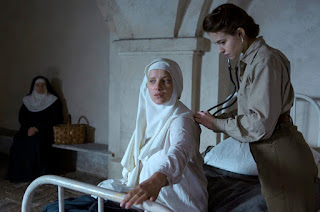Jottings - slice of life - 106 ( “The innocents” - an Anne Fontaine film)
Jottings - slice of life - 106 ( “The innocents” - an Anne Fontaine film)
“Faith is twenty four hours of doubt and one minute of illuminating hope..” - Wise Sister Maria explains to the young French red cross Doctor Mathilde Beaulieu, as she attempts to convince the Sister of the need to look beyond religious beliefs and vows to God. The history of sacred faith hinges around this pivotal point. Can one forsake deeply inculcated beliefs around God, heaven and sin to yield to matters of flesh? Can we abandon convictions of Hope, comfort and security in an afterlife to the ravages of the daily living and its horrors? Can we reconcile what happens to us now to what we have been given to believe for ages? Can we live for that one minute of clarifying hope while enduring every hour of unceasing doubt and apprehension? These are questions this beautiful film raises in our hearts and minds.
Much has been written, said and discussed on the horrors of second world war, and the moral deprivation that followed. Art is so full of it even today. However, when I watched the Polish film “The innocents”, yet another dimension of this moral savagery was bought to light. During the end of 1945, when Poland was left an orphan, caught in the crossfire of war, a secluded monastery for women situated deep in its icy forest was violated by group of Russian soldiers. Almost all the sisters - young and old embracing Christ as their divine Husband - were raped and left impregnated or otherwise diseased. It was a nightmare come true for them. Indoctrinated in the belief they are eternal virgins, and their body, mind and soul belonged only to God, and nobody else; they were left shamed, humiliated, surprised, dejected, confused, and in most cases began to reject the young life growing in their womb as an intrusion to be cast out as rubbish. It was a clash between deeply felt beliefs and life itself, and each reacted differently to this profound challenge of faith. A young doctor aspiring French doctor is summoned by one of the inmates attempts to help assuage their physical pain ; but she faces tremendous push back from the community , except for few Sisters, who had known worldly life before coming into the monastery. The babies, however, start come out one after the other, and the Sisters are faced with the moral dilemma of tending to a living child on one hand and adhering to a system of codified rules and beliefs on the other.
Anne Fontaine is one of my favorite directors. A few years ago, I reviewed her movie “Adore” in my blog. It was based upon a short novel by Dorris Lessing “The grandmothers”. Anne had grafted Lessing's controversial story to the wonderful beaches of Australia and staged the drama between teenaged boys and their attraction to each others Mom’s without giving way to vulgarity or sensationalism. She continues the same assured treatment of a difficult subject in “The innocents” too. The moral contradictions of faith and the living reality of body and its needs finds sensitive embodiment in the sequestered community of sisters. They are not wrong when they affirm they are wedded to Christ. Belief is a strong force, and sometimes can become the only real thing to hold on to. It is difficult for an outsider to empathize with kind of abstract certainty, until one becomes a believer himself. The young doctor Mathilde played beautifully by the French actress Lou de Laage is an non-believer; but her heart is filled with compassion for physically suffering sisters. She takes it upon herself to help them no matter what. In that attitude of moral empathy, she stands alongside them in their high moral high ground of religious beliefs. While Doctor Matilde wishes to ensure they are physically alright and can deliver without complication, the sisters wish to protect the kernel of sacred vows they have sworn to live by and refuse to be tended by her. The slow reconciliation between the two wonderfully unfolds as the movie progresses. The end is perhaps a little cliched, but the strength of the film lies in its ability to evoke a deep sense of sadness and an exhilarating sense of joy - both at the same time. There is a point where deep suffering and love meets, and that intersection is the axle point of transformation.
“The innocents” shows us a glimpse of what that transformation would feel like..
God bless..
yours in mortality,
Bala




Comments